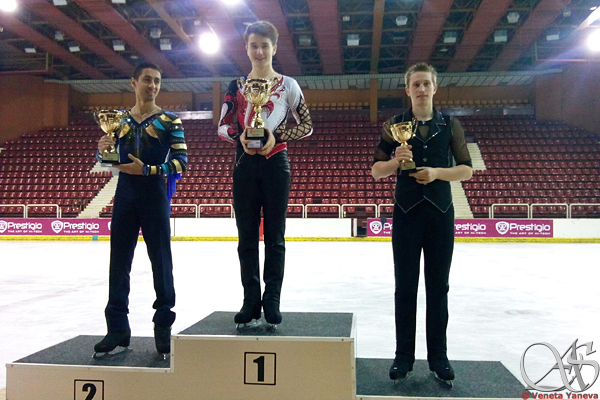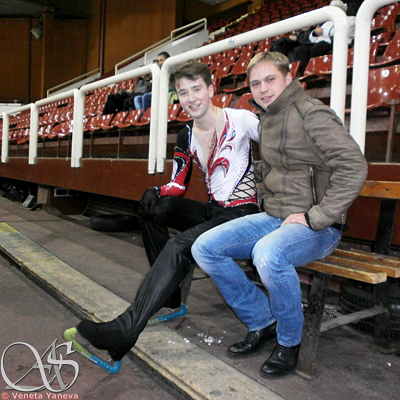 Misha Ge was the biggest attraction at the Denkova-Staviski Cup in Sofia at the end of last year. The 22 year old Uzbekistani figure skater won for the second time. He works with his parents Jun and Larisa Ge and for the last three seasons has been one of the most loved skaters due to his unique presentation skills. We had a brief chat with Misha before the awards ceremony.
Misha Ge was the biggest attraction at the Denkova-Staviski Cup in Sofia at the end of last year. The 22 year old Uzbekistani figure skater won for the second time. He works with his parents Jun and Larisa Ge and for the last three seasons has been one of the most loved skaters due to his unique presentation skills. We had a brief chat with Misha before the awards ceremony.
Misha, what is the correct pronunciation of your last name?
(laughing) Every competition it’s a question asked bymany people, how it is pronounced, because in different countries ‘G’ sounds different. But mostly the international pronunciation is Ge [dzi].
You are known also as the Skating Prince, a nickname you use in your social media accounts. How did you choose it?
This isn’t a name I chose; it’s one that fans around the world gave me. When I was a juniormany fans called me a „Skating Prince“ or „Little Skating Prince“. You know I wouldn’t have placed myself that high. It’s what people called me so I started using it. That’s the story behind my nickname.
You are here for the second time and you won for a second time. How do you feel?
It feels great to come back to the place where you had such good results. I came back and won another title. I’m very happy to be here and have a good performance. Also this time I feel the organizers of the competition did a very good job – even better than last time. And even the audience, I felt, was more knowledgable about this big competition and was more into it. It’s great when more people start to enjoy the sport. I understand it’s maybe not as big as other competitions, but compared to last year I see a really big improvement. You still need more time to get a larger audience, but I see improvements.
 You stayed here for about a week, working with Andrei Lutay. Tell me about that.
You stayed here for about a week, working with Andrei Lutay. Tell me about that.
Andrei and I have known each other for a couple of years. Even during other competitions he helped me because we have a very good friendship. He helps me with technique and his opinion is very important to me. Even my performance today was helped by him and I thank him for that.
This season you debuted at the Grand Prix series at your hometown of Moscow. How did you feel?
Yes, I was born in Moscow. We received the invitation from Moscow very close to the event. One skater withdrew and they asked me one week before the competition. We weren’t prepared to go so we had a lot of work to do. It was an honor for me to come back to the place where I was born and learned to skate. It was great to perform in front of my fans, family and friends.
Who chooses the music for your programs?
Our team. It includes my mom, my dad and me. They are figure skating coaches and also my coaches; also many, many judges and coaches from around the world – USA, China and Russia. I ask many people for their opinion which helps to create my unique style and I think the audience enjoys it, so it makes me happy.
Is it true that you do part of your ownchoreography?
I do most of the choreography myself. My mother has been a professional choreographer for over 20 years and I’ve learned from her since I was little. So watching her I started being a choreographer as well. Most of the choreography is mine.
Maybe that’s because you have a unique style and no one else can do it your way?
I try to create a unique style and learn from many people. And, of course, I try to show who I am.
You won an Olympic spot. How important is that for you and sport in Uzbekistan?
We’ve had Olympic skaters before. We had a great skater in the top 10 at Worlds and at the Olympics as well. But it’s the first time for me, and it’s wonderful to be part of such an important world event. I’ll do my best to prepare for it. Many people as me „What are your goals for the Olympics?“ Participation! I think participation is the more important aspect for me.
I think that for figure skating fans your place in the standings is not important. They just want to see you perform. What makes you so special?
I try to work hard and improve myself. I also hope people can enjoy my performance and I improve and perform for them.
What is most important for you, the jumps or the presentation?
I think everything is important; you must present everything together in one piece. After every competition you must look at which part is lacking and then improve upon it. In my opinion, being well rounded is important.
Finally, what are your expectations for the Olympics? Can you predict the top 3 or do you think that we have many strong skaters that will fight for the medals?
It’s very hard to answer this question. Everyone is guessing who will medal. I don’t know who to say, but my wish is that everyone skates well. I’d like everyone to have a great time and enjoy giving his performance.
Thank you for your time, Misha. Hope we will see you next year.
Maybe. It’s possible. I hope to come back again and Bulgarian fans will see me.
Note: The interview was published in Abolute Skting during the Olympics in Sochi.
